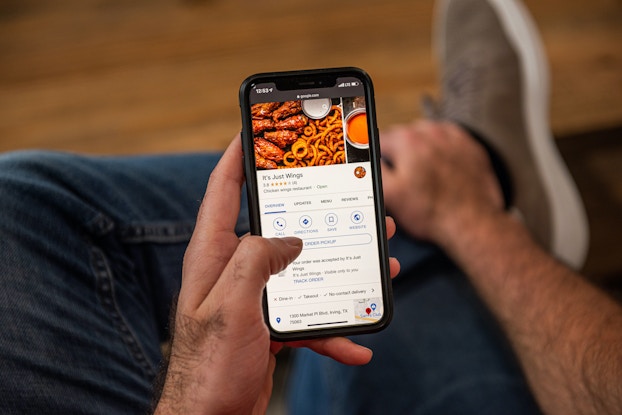
Why it matters:
- In a pandemic-changed landscape that altered shoppers’ spending habits, startups to large legacy brands are expanding buy now, pay later purchasing options for big-ticket purchases from bridal gowns to furniture.
- Restaurants are expanding delivery-only dining concepts as at-home eating trends persist.
- As COVID accelerated the rise of thrift store shopping in the digital era, businesses are also leaning into the $30 billion resale market.
The pandemic unleashed a torrent of business innovation, forcing companies to pivot to meet the demands of a consumer economy that’s seemingly changing in real time.
In turn, businesses have both monetized consumers’ COVID-informed demands and seized on the crisis’ downturns to uncork new revenue streams: Facing a massive loss of income from shuttered dining rooms across the nation, for example, restaurant brands from Applebee’s to P.F. Chang’s launched delivery-only brands that are churning newfound sales, just as retailers expand buy now, pay later (BNPL) options to follow consumer spending shifts in a pandemic-changed economic landscape.
Adding Afterpay has benefited us by providing alternative payment solutions for our customers and it's increased our overall average order value by 25%.Ranu Coleman, chief marketing officer, Azazie
Buy now, pay later trend impacts big-ticket purchases — from bridal gowns to furniture
Indeed, COVID has altered the way we shop, work, live and mark seminal events, including how we pay for big-ticket items like weddings.

Interested in a small business membership?
Find out how the U.S. Chamber of Commerce can help your company grow and thrive in today's rapidly-evolving business environment. Connect with our team to learn how a small business membership can benefit your bottom line and help you achieve your goals.
The pandemic altered brides’ notions of how they want to spend for their big day: Over half of brides polled said their wedding budget had shrunk amid COVID-19, according to Ranu Coleman, chief marketing officer of online bridal disruptor Azazie.
“Azazie has always been an affordable brand but the effects from COVID caused several of our brides to reevaluate how they wanted to allocate their budgets for their wedding day,” she told CO—. “We saw this shift and wanted to provide a solution.”
The brand partnered with BNPL platform Afterpay to help brides pay off large purchases, like wedding dresses, in installments.
The move comes as credit-averse consumers increasingly tap tech-driven BNPL platforms like Afterpay, Klarna and Affirm, which offer a modern-day version of layaway and charge little to no interest, for big-ticket purchases from furniture to bridal dresses.
The trend has grown in a pandemic-altered landscape that’s dealt economic blows to U.S. shoppers.
Younger shoppers have also fueled the trend, as 75% of BNPL users are millennials and Gen Z shoppers, according to eMarketer data.
While BNPL took flight via online merchants, now legacy brick-and-mortar merchants like warehouse club B.J.’s are adopting the payment strategy.
BNPL is already paying off for Azazie’s bridal business, Coleman said. “Adding Afterpay has benefited us by providing alternative payment solutions for our customers and it's increased our overall average order value by 25%,” she said.
[Read here on how to offer financing and layaway to customers.]

Startups build on the $30 billion resale market
Businesses are also leaning into the estimated $30 billion resale market, which was the fastest-growing segment of the fashion industry pre-pandemic.
COVID only accelerated the rise of thrift store shopping in the digital era via sites like ThredUp and Poshmark that sell pre-owned goods, with lesser-known startups like List Perfectly to high-profile player Rent the Runway capitalizing on the trend.
Rent the Runway’s secondhand designer clothes are now available to all shoppers to buy, not just rent. Previously, the startup, which closed stores and furloughed workers as its business plummeted amid the pandemic, only offered the buy option to shoppers paying an ongoing subscription.
The resale market has also benefited from the growing concern, especially among younger consumers, that once-owned clothing is bad for the planet and that reselling apparel keeps it out of the landfills.
List Perfectly brings a marketplace twist to a resale model that’s been tweaked to aid sellers in a COVID-changed landscape.
The platform enables an estimated 62 million resellers to bulk cross-post items, from clothes and jewelry to perfume and VHS tapes, on a growing list of peer-to-peer marketplaces like Poshmark and Depop (which Etsy acquired in June), instantly and simultaneously, with a click of a button.
But like all businesses large and small, List Perfectly’s independent sellers took a pandemic hit.
“Our members were struggling during quarantine because people weren’t spending as much money, so at List Perfectly our focus was to find ways to deliver more value for the same price,” Amanda Morse, co-founder and co-CEO of the site, told CO—.
To that end, the site nixed its paid catalog upgrade, which its sellers paid for, and now offers product catalogs at no additional cost “so our members are free to grow their business even more,” she said. “We also launched a seller-sourced giveaway program where we buy items directly from our members and then give those same items to sellers who are having difficulty sourcing products to sell.”
The moves have delivered for the brand, Morse said. “We have seen a 25% growth month over month in members in the past year, and there have been 20 million listings cross-posted on the site,” Morse said, which now generates $500,000 in annual sales.
List Perfectly ranks among a growing number of marketplaces from Facebook and Google to Etsy, and niche sites like Market Wagon for local farmers, that are fast becoming a major selling platform for small businesses.
[Read here for13 post-pandemic business ideas.]

Delivery-only, subscription models drive newfound business for restaurant brands
Spending on restaurant delivery more than doubled during the pandemic, further igniting the trend toward off-premise consumption.
In the year ending March 2021, restaurant delivery orders surged 124% compared with the prior year, according to NPD Group’s CREST research.
Restaurants from Applebee’s to It’s Just Wings, reeling from the loss of the sit-down business as the pandemic shuttered dining rooms across the country, whipped up delivery-only brands to capitalize on the takeout boom that saw consumers flock to apps like DoorDash and Grubhub.
While the move generated much-needed sales during the darkest days of the pandemic, brands are growing the concept even with dining rooms now open for business.
P.F. Chang’s, for one, will expand the to-go takeout-only concept it launched last year to 50 locations by the end of 2022, as the model proved a hit with its customer base, its CEO said.
Food-service merchants are also taking a page from the subscription-model playbook (think Amazon Prime), to incentivize replenishment purchases.
Pret in the U.K. is offering shoppers “barista-made drinks all day long” for 20 euros a month to boost not only sales and foot traffic but stoke customer loyalty, noted Andrew Busby, founder of London-based consultancy Retail Reflections, which counts brands from UPS to Klarna among its clients.
"Research shows that up to 35% of us remain wary and cautious of venturing into shops, bars and restaurants,” he told CO—. “Therefore, in the new world of post-pandemic retail and hospitality, brand loyalty and customer retention will be more important than ever. One way to achieve this is by moving more towards a subscription model where the customer receives — and perceives — real value in return for their loyalty."
CO— aims to bring you inspiration from leading respected experts. However, before making any business decision, you should consult a professional who can advise you based on your individual situation.
Follow us on Instagram for more expert tips & business owners’ stories.
CO—is committed to helping you start, run and grow your small business. Learn more about the benefits of small business membership in the U.S. Chamber of Commerce, here.







